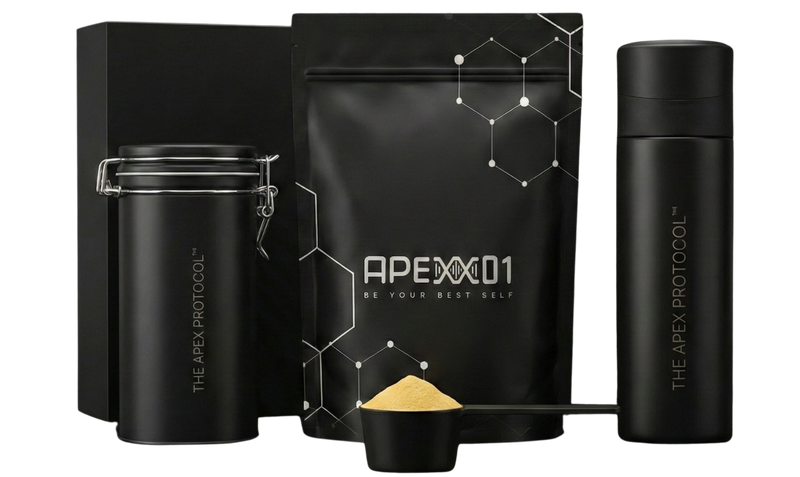Our Philosophy
We built what we couldn’t find.
Apexx01 is a complete daily formula with no hidden blends, only effective doses, and ingredient forms chosen for function. What normally requires dozens of supplements is delivered in one verified daily scoop.
One scoop. One routine. No second-guessing.
Apexx01 supports daily energy, cognition, metabolism, recovery, immunity, and overall balance within one verified system.
Cognitive Support
Supports clarity, focus, and daily performance with verified nutrients.
Formulated with verified nutrients that contribute to normal psychological and neurological function — supporting clarity, focus, and daily performance.
Energy & Metabolic Efficiency
Maintains steady energy with vitamins and minerals for normal metabolism.
Includes key vitamins and minerals that contribute to normal energy-yielding metabolism — designed to help maintain steady energy throughout the day.
Recovery & Immune Maintenance
Supports immune function and protects cells from oxidative stress.
Provides nutrients that support the normal function of the immune system and assist in protecting cells from oxidative stress — essential factors in post-exercise and daily recovery.
Stress Resilience & Balance
Maintains psychological resilience and reduces fatigue under demanding conditions.
Contains adaptogenic botanicals and micronutrients selected to help maintain normal psychological resilience and reduce fatigue — supporting balance under demanding conditions.
Engineered for precision. Built for those who operate with control.


Rated 4.7/5 based on 87 reviews
I am very glad I found this product
I am very glad I found this product. Since using it for a few weeks, I have noticed a big change in my energy levels and feel lighter on my feet. I highly recommend for anyone feeling lethargic or just wanting a boost in energy.
J S
VerifiedA real upgrade
I immediately got more energy! The deliveries are punctual. The product does what it’s supposed to do, I’ve gained more energy. Not cheap, but effective, so definitely worth the money!
Janet van der Have
VerifiedAmazing energizer sets the tone for the day!
Super energising supplement with quality ingredients! I take it in the morning and it gets rid of the morning drowsiness and feel 100% present
Noah Bala
VerifiedVery satisfied with Apexx01.
Very satisfied with Apexx01, I’ve been using it for about 7 weeks now, and my intestinal issues (which I had for the past 10 years) have completely disappeared!
Toon
VerifiedThe Apexx ProtocolStarter Kit
Everything you need to begin your 30-day precision protocol.Included with your first order.

EU Compliant
Lab Verified
30 Scoops
30-day supply in premium matte black pouch
Storage Container
Airtight vessel for optimal freshness
Shaker Bottle
Premium matte black mixing vessel
Starter Guide
Complete protocol instructions
Behind The Protocol
No secrets. No blends.
No marketing dust.
The ingredient composition of Apexx01, grouped by functional category for clarity.
Co-enzyme Q10 (ubiquinone)
Cordyceps (sinensis powder)
Folic acid
L-phenylalanine
L-tyrosine
Moringa powder (Moringa oleifera)
NADH (nicotinamide-adenine dinucleotide)
PABA (para-aminobenzoic acid)
PQQ (pyrroloquinoline quinone)
Quercetin
Reishi extract 4:1 (Ganoderma lucidum)
Vitamin B1 (thiamine mononitrate)
Vitamin B12 (methylcobalamin)
Vitamin B2 (riboflavin-5-phosphate)
Vitamin B3 (niacinamide)
Vitamin B5 (pantothenic acid)
Vitamin B6 (pyridoxal-5-phosphate)
Biotin (D-biotin)
Chromium (chromium picolinate)
Co-enzyme Q10 (ubiquinone)
Copper (copper citrate)
Iodine (from kelp)
Iron (iron fumarate)
MSM (methylsulfonylmethane)
Magnesium (magnesium bisglycinate)
Manganese (manganese gluconate)
NADH (nicotinamide-adenine dinucleotide)
Omega-3 fish oil powder
PQQ (pyrroloquinoline quinone)
Potassium (potassium gluconate)
Selenium (Lselenomethionine)
Vitamin A (retinyl acetate)
Vitamin C (L-ascorbic acid)
Vitamin D3 (cholecalciferol)
Vitamin E (D-alpha-tocopheryl acetate)
(Fish) Collagen
Dandelion root extract 4:1 (Taraxacum officinale)
Hyaluronic acid (sodium hyaluronate)
L-glutamine
L-isoleucine
L-leucine
L-lysine (L-lysine hydrochloride)
L-methionine
L-threonine
L-valine
Lady’s mantle extract 10:1 (Alchemilla vulgaris)
MSM (methylsulfonylmethane)
Milk thistle extract standardized to 80% silymarin (Silybum marianum)
Watercress extract 10:1 (Nasturtium officinale)
Apple cider vinegar powder
Bioflavonoid
Cordyceps (sinensis powder)
Dandelion root extract 4:1 (Taraxacum officinale)
Iron (iron fumarate)
Milk thistle extract standardized to 80% silymarin (Silybum marianum)
Moringa powder (Moringa oleifera)
Quercetin
Reishi extract 4:1 (Ganoderma lucidum)
Selenium (Lselenomethionine)
Vitamin C (L-ascorbic acid)
Vitamin D3 (cholecalciferol)
Vitamin K2 (menaquinone MK7)
Zinc (zinc citrate)
Bioflavonoid
Co-enzyme Q10 (ubiquinone)
L-Glutathione
L-glutamine
MSM (methylsulfonylmethane)
Manganese (manganese gluconate)
NADH (nicotinamide-adenine dinucleotide)
PQQ (pyrroloquinoline quinone)
Quercetin
Selenium (Lselenomethionine)
Vitamin C (L-ascorbic acid)
Vitamin E (D-alpha-tocopheryl acetate)
Zinc (zinc citrate)
Apple cider vinegar powder
Bioflavonoid
Dandelion root extract 4:1 (Taraxacum officinale)
Milk thistle extract standardized to 80% silymarin (Silybum marianum)
Moringa powder (Moringa oleifera)
Psyllium husk
Watercress extract 10:1 (Nasturtium officinale)
Calcium (calcium citrate)
Copper (copper citrate)
Hyaluronic acid (sodium hyaluronate)
Magnesium (magnesium bisglycinate)
Potassium (potassium gluconate)
Zinc (zinc citrate)
All ingredients are third-party tested for purity and potency. Manufactured in EU-certified facilities following GMP standards. Complete certificates of analysis available upon request.
THE APEX PROTOCOL
Our structured system for verified daily nutrition, built to replace guesswork with consistency.
The Philosophy
The commitment to remove noise and build only with ingredients that serve a real purpose.
Every batch undergoes rigorous third-party testing in accredited laboratories. We verify ingredient identity, purity levels, heavy metal content, and microbial safety to ensure you receive exactly what the label promises.
The Standard
Every ingredient verified before formulation. No proprietary blends. No guessing.
Independent testing. Certified production under ISO and HACCP systems. Every ingredient verified before formulation. Each batch tested by accredited third party laboratories.
The Composition
A complete formula of fifty-two nutrients chosen for purpose, form and compatibility.
A complete formula of fifty-two nutrients chosen for purpose, form and compatibility. Every mg accounted for. Nothing hidden. No blends. No surprises.
The Promise
If Apexx01 does not meet expectations, we refund.
If Apexx01 does not meet expectations, we refund. No returns. No forms. No friction. The responsibility stays with us, not the client.
